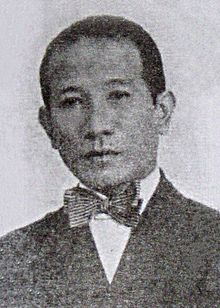Andjar Asmara | |
|---|---|
 Andjar, 1930 | |
| Born | Abisin Abbas 26 February 1902 |
| Died | 20 October 1961 (aged 59) |
| Nationality | Indonesian |
| Known for |
|
| Spouse | Ratna Asmara |
Abisin Abbas (Indonesian: [aˈbisɪn aˈbas]; 26 February 1902 – 20 October 1961), better known by his pseudonym Andjar Asmara ([anˈdʒar asˈmara]), was a dramatist and filmmaker active in the cinema of the Dutch East Indies. Born in Alahan Panjang, West Sumatra, he first worked as a reporter in Batavia (modern-day Jakarta). He became a writer for the Padangsche Opera in Padang, where he developed a new, dialogue-centric style, which later spread throughout the region. After returning to Batavia in 1929, he spent over a year as a theatre and film critic. In 1930 he joined the Dardanella touring troupe as a writer. He went to India in an unsuccessful bid to film his stage play Dr Samsi.
After leaving Dardanella in 1936, Andjar established his own troupe. He also worked at a publishers, writing serials based on successful films. In 1940 he was asked to join The Teng Chun's company, Java Industrial Film, helping with marketing and working as a director for two productions. After the Japanese occupation, during which time he stayed in theatre, Andjar made a brief return to cinema. He directed three films in the late 1940s and wrote four screenplays, which were produced as films in the early 1950s. He published a novel, Noesa Penida (1950). Afterward he worked for the remainder of his life writing serials based on local films and publishing film criticism. Historians recognise him as a pioneer of theatre and one of the first native Indonesian film directors, although he had little creative control of his productions.